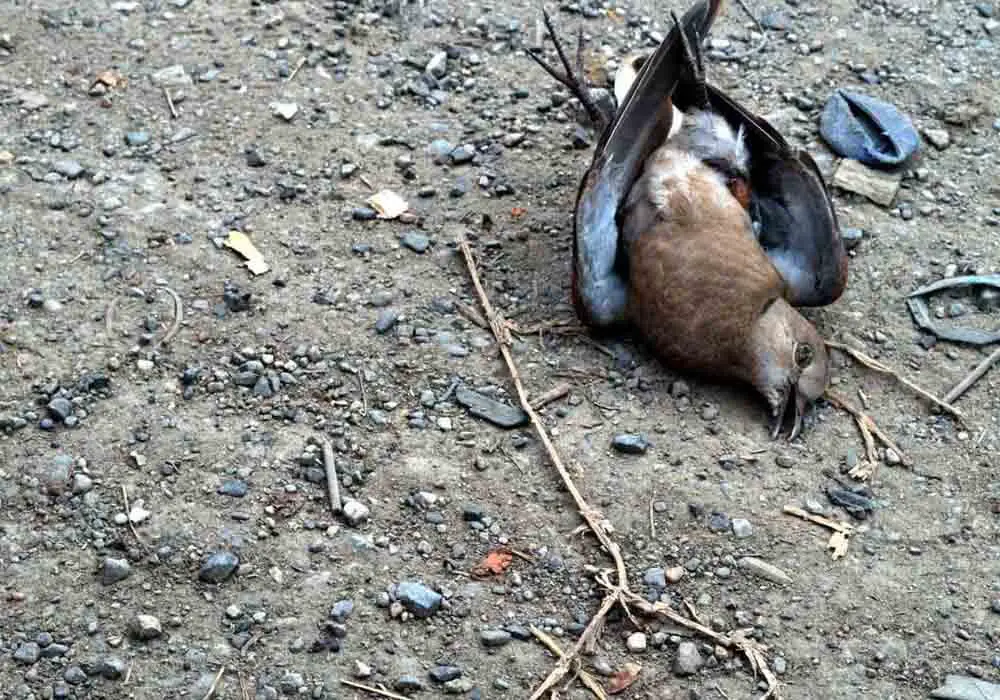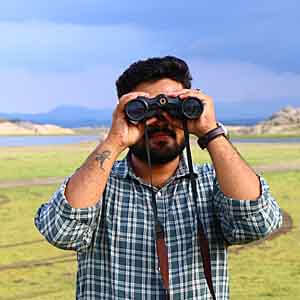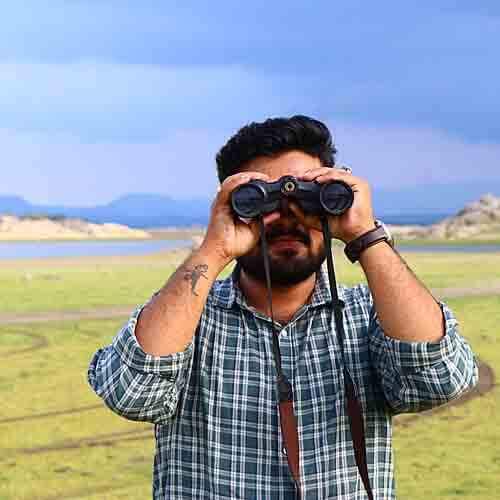How Do Birds Die?
Birds play essential roles in the ecosystem, such as insect control and seed dispersal. Furthermore, they enhance landscapes with their beautiful sights and sounds. Nonetheless, when subjected to harsh conditions, bird populations start to diminish, but how do birds die?
Birds can die suddenly or slowly from natural causes, diseases, exposure to toxic gasses, extreme stress or shock, loss of their natural habitat, and being preyed on by invasive species. They may also die from collisions with objects such as airplanes, moving vehicles, and buildings.
This article covers this topic in greater detail. I will shed more light on questions such as how do birds die suddenly, what they do before they die, where birds go to die naturally, and what happens after they die. I will also delve into some specific causes of bird death.

Bird Death Explained: What You Need To Know
Understanding why and how birds die gives us valuable insights into how we can better care for the birds around us and preserve this critical animal group.
As highlighted earlier in regards to how do birds die, birds can succumb to various unfavorable conditions. Some of these conditions may result from natural causes (such as aging). In contrast, others come from human activities that interfere with the natural habitats of these birds (for instance, air pollution from industries).
Let's consider what happens to birds before they die.
What Do Birds Do Before They Die?
Before dying, a sick bird may attempt to hide signs of illness. The bird may also become unusually quiet and still, with its feathers fluffed up. A dying bird's final step is to go into hiding in a safe, isolated place where it will hide from potential threats in its final moments.
Although they may try to hide signs of illness, a keen inspection can help you save a dying bird. Look out for the following symptoms:
- Swollen or watery eyes
- Reduced appetite (a bird may pretend to eat to avoid drawing attention, so check carefully)
- Shivering
- Struggling to breath
- Blood-tinged feces
- Puffed feathers
- Shedding feathers
- Coughing
- Vomiting
Where Do Birds Go To Die Naturally?
Aging birds go to die naturally in secluded places where they feel safe. This may be inside a tree cavity (for woodpeckers), a thick bush, or in their nest. They seek out these hidden places to protect themselves from predators and threats, such as harsh environmental conditions.
Birds avoid showing signs of vulnerability at all costs, which is why they disguise signs of illness or weakness for as long as possible. However, they seek an isolated place to die when they become too old and weak.

Globally speaking birds are dying in record numbers...but why? Is there a man made cause? Or is it a natural die-off? Here's a helpful article of ours which will explain everything in detail.
How Do Birds Die Suddenly?
Birds may die suddenly from poisoning, acute toxicity, electrocution, illness, stress, or organ failure. Additional causes of sudden bird death include collision with a moving or stationary object and being hunted down by predators.
Due to their high metabolism, birds deteriorate quickly upon exposure to poisons and toxins. For this reason, scientists consider bird populations declining as indicators of environmental pollution.
Collision is another common cause of sudden bird death, and below are typical culprits:
- Windows
- Wind turbines
- Moving cars and airplanes
- High tension wires
- Communication towers
Can Birds Overheat and Die?
Birds can overheat and die when exposed to temperatures above 104 degrees Fahrenheit (40 degrees Celsius). When the temperatures rise beyond this point, any adaptations that the birds have to regulate body temperatures may no longer suffice, causing severe dehydration and death.
Birds exposed to acute temperatures will suffer from hyperthermia. Signs of hyperthermia include:
- Fluffing wings to cool down the body
- Panting or breathing with the mouth open
- Stressed breathing
- Unusual passivity or aggression
- Drooped wings or holding their wings away from their body
You can provide relief to an overheated bird by applying room-temperature water to its body through the following methods:
- Gently dabbing its skin with wet cotton balls
- Spraying the bird with a gentle water mist
- Giving the bird a gentle bath
Do not use cold water when cooling off a bird suffering from hyperthermia because this may cause the bird to go into shock.

Regardless of species, birds play an important role to Earths ecosystem. You'd be surprised just how far their influence goes! Here's an interesting article of ours which explains everything as to the importance of birds.
Can Birds Die From Stress or Shock?
Birds can die from severe stress or shock. Lethal stress may be caused by illness, anxiety, loud noise, malnutrition, hyperthermia, and chronic under stimulation (which causes depression). Fatal shock is often the result of sudden and severe injuries inflicted on the bird.
Like humans, birds can suffer from depression, often caused by under-stimulation and boredom. This is more common in caged or domesticated birds and can eventually cause bird death.
Some signs that can indicate a stressed bird include:
- Decreased appetite
- Exhibiting more aggression
- Engaging in self-harm such as feather-picking and chewing on their skin
- Becoming easily startled
- Screaming
On the other hand, a bird suffering from severe shock will appear weak and unresponsive. It may also be struggling to breathe and move. To help a bird recover from shock, place it in a dark, quiet room away from stimuli such as loud noises.
You can also take the bird to a vet for better assessment and treatment.
Why Do Baby Birds Die in the Nest?
Baby birds can die in the nest when exposed to severe conditions such as starvation, being killed by predators or their parents or siblings, dehydration, hyperthermia, and infection by parasites and diseases.
Baby birds, also called hatchlings, are especially vulnerable because their immune systems are still developing. Moreover, other defense mechanisms such as feathers, which help with thermoregulation, and flight, which enables them to escape predators, are still underdeveloped and may not adequately keep them safe from danger.
Do Birds Just Drop Dead?
Birds do not typically just drop dead, especially not mid-flight. However, when they do, it is because they have died from sudden impact (or collision) or after being struck by a predator.
Sick, weak, or aged birds will hardly have the energy to fly around. Since they prefer to die in a secluded place, they are unlikely to drop dead out in the open.
Can Birds Just Fall Out of the Sky?
Though rare, some reported cases of birds dropping dead from the sky do exist. One example of this happened in Mexico in February of 2022, when a flock of yellow birds fell dead from the sky.
Scientists speculated that the flock was forced low, and the birds crashed into the ground when trying to escape a predator.
Besides such rare occurrences, birds may also fall out of the sky after being killed from collisions with moving or stationary objects (which I highlighted earlier).
Nonetheless, you can expect to see birds falling out of the sky only once every blue moon: it's pretty rare.
When Birds Die, What Happens?
When a bird dies, its body may be eaten up by a scavenger or infested by insects and bacteria. Any remaining parts will quickly decompose and disintegrate until hardly anything is left.
Scavengers such as vultures, stray cats, and coyotes will feed on the bodies of dead birds, but in most cases (especially with smaller birds), insects such as larvae and flesh flies will be first to feast on the dead bird.
Bacteria will cause decomposition, causing any remaining organic matter to disintegrate and apparently 'disappear.'
Seemingly inedible parts such as the feathers are eaten by rodents and insects such as beetles. Some animals also use bird feathers to make their nests.
How Quickly Does a Bird Decompose?
Birds can decompose as quickly as two days from the day they die. This rapid decomposition can be attributed to their low body mass or being quickly consumed by scavengers, insects, and bacteria. Bacteria decompose little pieces of remaining bone or flesh.
This short decomposition time would explain why you hardly ever see dead birds lying around (which may be a good thing since many people associate dead birds with bad luck).

Though death is the birds ultimate end, the journey to get there is a fascinating one. We discuss the entire life cycle of a bird in this interesting article which you can read here.
How To Handle A Dead Bird
Bird carcasses could be carriers of harmful pests and diseases and should therefore be handled cautiously.
What safety precautions should you take if you come across a dead bird in your yard? Here are a few pointers:
- Do not handle the bird carcass with bare hands, but wear gloves or a plastic bag over your hands.
- Keep the carcass as far away as possible from yourself to avoid contaminating your clothes or skin (you may use a shovel to pick it up).
- Place the dead bird in two plastic bags and seal the top with a knot.
- Dispose of the bag in the garbage.
- Wash your hands thoroughly afterward.
How Do Birds Die...Final Thoughts
There are several causes of bird death. Unfortunately, birds rarely die of old age unless they are domesticated. In most cases, wild birds are hunted down by predators or succumb to adverse conditions. Another common cause of bird death is diseases and collisions with obstacles in their flight path.
Dead birds decompose quite quickly, but if you ever need to handle a bird carcass, ensure that you wear gloves and dispose of the remains far from other people and pets. Doing this will prevent the potential spread of pests and diseases that may cause adverse health effects.
Back To The TOP Of This
How Do Birds Die Page

About the Author...
Richard Worden, a dedicated bird lover for over 20 years, I love to share my in-depth knowledge and passion for birds. Read more About Me and my expertise in this field.
- We Know Birds HOME ›
- Bird Facts and Information ›
- How Do Birds Die?
